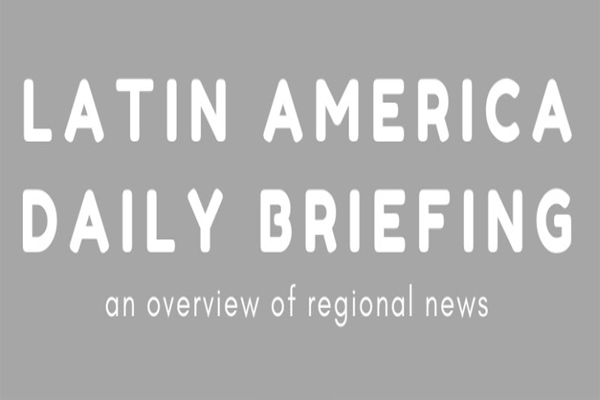
Colombia’s security model played a significant role in the country’s long, violent internal conflict, according to a truth commission report released yesterday that calls for sweeping military and police reform.
The report, produced by a commission that was formed as part of a historic 2016 peace deal with the Revolutionary Armed Forces of Colombia (Farc), delivered a scathing rebuke of the Colombia’s drug policy in recent decades, and emphasized the harmful effects of U.S. collaboration with Colombia’s security forces. (New York Times)
The more than 1000-pages report has been developed over four years and involved more than 14,000 individual and collective interviews. This is the first installment, and focuses on recommendations to avoid repetition of the decades-long armed conflict in Colombia, reports La Silla Vacía.
The final report, which will be released in installments in coming weeks, is envisioned as the most detailed account yet of the atrocities committed by all sides in the country’s 52-year civil conflict, the longest-running in the hemisphere. (Washington Post)
The commission found that “the union of the interests of United States and Colombia led to the construction of Plan Colombia”, a massive multibillion-dollar military aid program that began in 2000, “which merged together the counter-insurgency, anti-terrorist and anti-narcotics programmes with the war against narco-terrorism.” (Guardian)
“The consequences of this concerted and largely U.S.-driven approach,” the report said, led to a “hardening of the conflict in which the civilian population has been the main victim.”
The report, titled “There is a future if there is truth,” urges a substantial change in Colombia’s drug policy, and a transition towards regulation of drug markets. Other recommendations included advancing peace talks with the National Liberation Army (ELN), tackling corruption and guaranteeing quality of life and dignity for all communities. (Reuters)
Broadly, the recommendations focus on eight topics: construction of peace as a national project; victims; political system and participation; drug trafficking; impunity; security; territorial peace; culture for peace and education. (La Silla Vacía)
The recommendations are in line with many of president-elect Gustavo Petro’s campaign commitments. Petro, as well as vice president-elect Francia Márquez, attended yesterday’s presentation.
Petro spoke yesterday, his first speech since winning the presidency earlier this month, and advocated for a “big peace,” focused on the structural causes of violence that continues to plague parts of Colombia. (La Silla Vacía)
President Iván Duque, who critics have accused of slow-walking key clauses of the deal, was absent at yesterday’s presentation.
From 1985 to 2018, 450,664 people were killed in the conflict, according to the truth commission, while 55,770 were kidnapped between 1990 and 2018. More than 7.7 million people were displaced from 1985 to 2019 and 121,768 were disappeared between 1985 and 2016, it added.
More on Colombia’s Conflict
- Colombian refugees in Ecuador increasingly note the growing presence of Colombian armed groups there, evidence of the transnational reach of “local” armed actors. (Nacla)
News Briefs
Ecuador
- An opposition effort to oust Ecuadorean President Guillermo Lasso failed in Congress yesterday, obtaining 80 of the 92 votes needed to remove him from office. (Reuters)
- Lasso said he will not negotiate further with Leonidas Iza, the leader of Ecuador’s powerful confederation of Indigenous groups, who have led weeks of protests against the government. (Reuters, see yesterday’s briefs)
Regional Relations
- U.S. President Joe Biden will host his Mexican counterpart Andrés Manuel López Obrador in Washington in July, a visit planned after AMLO boycotted the U.S.-hosted Summit of the Americas this month. (Reuters)
- Networks of Mexican feminist collectives working with counterparts in the United States are ramping up their efforts to help women in the U.S. who are losing access to abortion services to end their pregnancies, reports the Associated Press.
- Brazilian President Jair Bolsonaro spoke by phone to his Russian counterpart, Vladimir Putin. They said they discussed global food security and confirmed their intention to strengthen their strategic partnership, reports Reuters.
Brazil
- Environmental advocates hope the killings of Dom Phillips and Bruno Pereira could represent a turning point for conservation efforts. But past high-profile assassinations of defenders — Chico Mendes in 1988 and Dorothy Stang in 2005 — offer little hope of lasting change, reports the Guardian.
Peru
- Perú Libre formally removed President Pedro Castillo from the party, yesterday. (El Comercio)
- The split comes after months of party infighting and a worsening standing for the Castillo, who faces mounting corruption investigations and dropping popularity. (Latin America Risk Report)
- Castillo’s administration sent a bill to Congress that would punish with jail-time the revelation of “reserved information,” a gag law that comes amid increasing allegations of corruption in the administration, reports El Comercio.
Chile
- Chile’s Constitutional Convention finalized the draft process for a new magna carta. The 388-article proposal will be formally presented on July 4, and submitted to a plebiscite on Sept. 4. (Guardian, see last week’s Chile Constitutional Updates)
Migration
- Cuba’s Coast Guard was recently involved in two shootouts at sea with speedboats coming from the United States to pick up Cuban migrants, resulting in the death of one of the smugglers. The Cuban authorities said they have intercepted 13 speedboats and detained 23 people from the United States involved in migrant smuggling operations this year, reports the Miami Herald.
Regional
- Venezuela shuttered schools, opened shelters and restricted air and water transportation today as a tropical disturbance sped through the southern Caribbean on a path to Central America. Curacao imposed a curfew late this morning. (Associated Press)
- The disturbance earlier affected Trinidad & Tobago, where officials said the storms caused power outages and temporarily shut down wastewater plants. (Associated Press)
- Three tropical disturbances in the Atlantic are in varying stages of development in the Caribbean, and it’s possible that the first Atlantic hurricane of 2022 will form by the end of the week, reports the Washington Post.
Jordana Timerman/Latin America Daily Briefing
http://latinamericadailybriefing.blogspo












